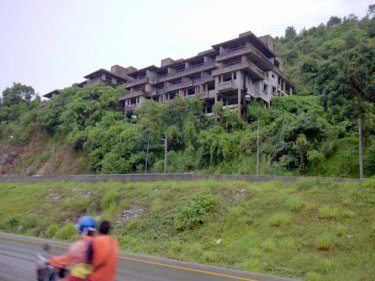There have been ''lots of complaints'' about developers who failed to deliver on schedule, the Director of the Damrungtam provincial complaints office, Praphan Khanprasang, told a meeting yesterday.
Vice Governor Somkiet Sangkaosutthirak said he wondered whether investors in condominiums on Phuket were ''concerned in the same way that we are.''
''I am not sure that business people are looking at Phuket in the right way or the wrong way,'' he said.
Regulations governing condominiums and their sale needed to be overhauled, the meeting at Phuket Provincial Hall in Phuket City was told.
Phuket Chamber of Commerce Director Keangsak Suksomboon said that regulations required parking spaces to be provided for 30 percent of condos in any development.
With everyone on Phuket forced to use motorcycles or cars because of the lack of public transport, the figure should be more like 60 to 70 percent, he said.
Thai law also meant that condominium developers were required to finish construction then take the chanote land title to the Phuket Titles Office before the accommodation could be registered.
In most cases, sales these days were taking place off the plan, before completion, Khun Keangsak said.
Where banks had provided loans to developers and held the title as collateral, complications sometimes ensued, he said.
Vice Governor Somkiet said he was concerned about the effect the number of condos could have on the economy of Phuket.
Figures from a recent newspaper report suggested that 15,500 condominium units worth 34.6 billion baht have been launched on Phuket as of last month.
Seventy-five percent have been sold, according to the Agency for real Estate Affairs. Sales average 1630 units a month, so the inventory in the market would take about 2.3 months to sell out.
However, many of the sales are believed to be to low-start off-the-plan buyers who face larger payments later in their purchase contracts. Some purchasers are known to have ''bought'' several condos in the hope of making a profit on resale.
Industry experts are concerned about whether resale values will be as high as investors expect and whether some developments could be forced to convert to tourist accommodation as a stop-gap measure.





Real estate developments (or size of which), especially commercial real estate developments, in other countries are primarily dictated by parking.
Parking requirements are typically based on a formula.
Development in Phuket has proceeded in a haphazard fashion and has resulted in it's thoroughfares choked with vehicles parked in the streets because little or no parking has been made available onsite to businesses and residential developments.
Legislation should be enacted to remedy this situation and qualified people should be hired to replace many of the current people in the Awbitors and Thesabahns who are not to qualified to perform this function.
It incomprehensible that the Thai government has not made more efforts for foreigners to purchase condominiums within a more transparent, secure manner. After all, a registered condominium is the only real estate investment that foreigners are allowed to purchase in Thailand.
Why haven't surety, performance bonds and title insurance been made available to allow foreigners to enter into a purchase with some degree of safety?
Due to the legal restraints on foreign ownership of property in Thailand, it could be argued that condominiums are severely overpriced in relation to similar purchases in other countries where those restraints do not exist. My feelings are if foreigners must pay a premium for a condominium, at least make the purchase more convenient and risk-free.
If Thailand wishes to charge developed-world prices, it should deliver developed-world quality services and a suitable legal structure to facilitate foreign investment.
Posted by bustersizemore on April 19, 2013 20:52